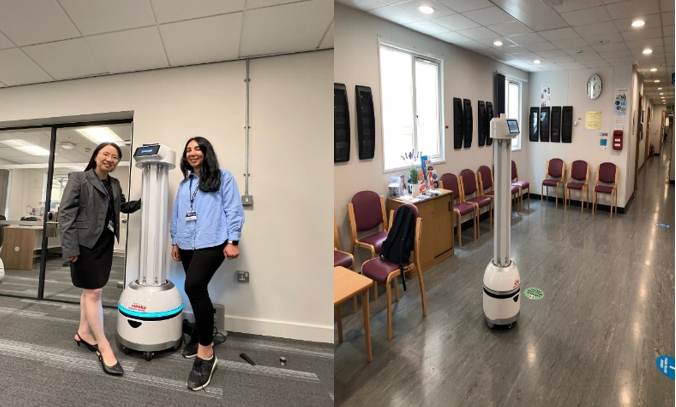
Dr Esyin Chew and Aveen Najm
Cardiff School of Technologies
Global Academies’ Santander Fellow, Dr Esyin Chew’s research explores the use of robotics to combat highly contagious diseases in global healthcare, hospitality, and education environments. Robots have been used to reduce the number of harmful pathogens in global settings, such as the Heathrow and Doha airport. And whilst, robotic UV disinfection has proven highly effective in killing up to 99% of harmful pathogens (Heathrow, 2022; Doha Airport, 2021), many hospitals, schools, and hospitality venues cannot access this technology due to high costs, and ongoing health concerns around prolonged exposure to UV-C light to humans.
Dr Chew, the director of EUREKA Robotics Centre, at Cardiff Met partnered with academics from PDR and industry partners to pioneer new robotic technology which enables the use of robots for disinfection of harmful pathogens, whilst being safe for use when humans are present. Chew’s partnership also brought down the cost of these UV disinfection robots by 50-80% by designing and rapid prototyping an affordable and accessible robotic version using their interdisciplinary academic expertise and resources.
With grounding from the Welsh Government funded Healthcare Robotics as a Service project, Dr Chew and her team purchased a disinfection robot for piloting and physical visualisation and to obtain the perspectives of stakeholders (e.g., healthcare workers, cleaners, etc.) to the next generation of Far-UV Robotics design. Two robots are currently placed with the industry partner and in EUREKA Robotics Centre. The disinfection robot was tested in the Cardiff School of Technologies prior to the deployment at Llandough hospital. Click on this video link to see it in action!
The disinfection robot has now been deployed to Llandough hospital and Dr Chew’s team have trained assistant nurses how to control and operate the robot. Healthcare staff asserted:
“We expect the robots in the short term to discharge some of the high-risk work such as daily disinfection...We tried a few in the last pilot and the robot was great fun, much better than IPads or traditional computers”
“I would love to see the Far-UC Disinfection robot. This would be much powerful than the current UVC robot in place, which I don’t have to evacuate people around during the disinfection process, just can’t wait!”
Further research questions arising from Dr Chew’s GA Fellowship include an exploration of how stakeholders in healthcare environments can coexist with and maximize the benefits of the disinfection robot while performing their day-to-day tasks. In addition to the Global Academies Santander Fellowship funding that made the project possible, Dr Wai Keung Fung, the Deputy Director of EUREKA Robotics Centre, is leading the team to apply for a larger scale of grant for the next prototype development and to bring the project to the next level. This will include a larger scale of field experimentation and commercialisation. Dr Chew’s project will provide a Welsh and UK robotics case study for international reference, as well as one of the impact case studies for the next REF in the UK.